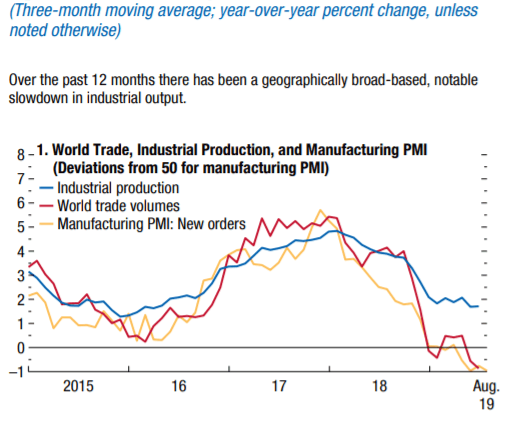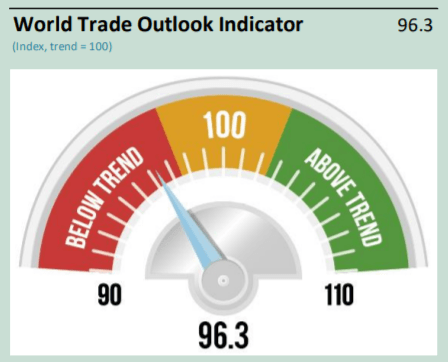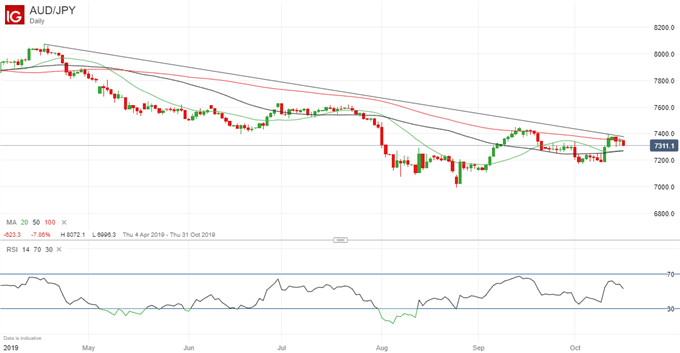Trump's Trade Wars: The Global Economy Is Slowing
TRUMP’S TRADE WARS AND THE GLOBAL ECONOMY
Evidence is mounting that US President Donald Trump’s trade disputes with countries and regions including China and the EU are reducing global trade flows and thereby having a harmful impact on economic growth worldwide.
The International Monetary Fund, for one, is in little doubt. “The global economy is in a synchronized slowdown and we are, once again, downgrading growth for 2019 to 3%, its slowest pace since the global financial crisis,” according to the IMF’s Gita Gopinath.
“Growth continues to be weakened by rising trade barriers and increasing geopolitical tensions. We estimate that the US-China trade tensions will cumulatively reduce the level of global GDP by 0.8% by 2020, she added.
The IMF is certainly not alone. European Council President Donald Tusk said at the start of the August summit of the Group of Seven leading industrialized nations that escalating trade tensions between Trump and other world leaders risk throwing the world into recession, bemoaning “senseless disputes” that had ripped countries apart. “This may be the last moment to restore our political community,” he added.
GLOBAL ACTIVITY TRADE INDICATORS
(Click on image to enlarge)

Source: IMF
‘TRADE WARS ARE GOOD’
This link between trade conflicts and slower global growth is, naturally, not Trump’s opinion. In 2018, he wrote on Twitter that “When a country (USA) is losing many billions of dollars on trade with virtually every country it does business with, trade wars are good, and easy to win.”
Moreover, from a simplistic textbook perspective, there is no reason why reduced trade flows should hurt economic growth. One of the first equations students of economics learn is that Y = C + I + G + (X - M), where Y is the national income measure of the size of an economy, C is consumption, I is investment, G is government spending, X is exports and M is imports. It therefore follows that if exports and imports both decline by similar amounts there is no impact on the size of the economy, or GDP (Gross Domestic Product).
However, the Federal Reserve noted in the minutes of its Federal Open Market Committee meeting in September that trade tensions could affect US interest rates: “Market participants remained attentive to a range of global risk factors that could affect the policy rate path, including trade tensions between the United States and China,” it said. The Fed noted too that “trade policy concerns continued to weigh on firms’ investment decisions” and that “trade tariffs pointed toward continued softness in factory output in coming months”.
If the Fed is right, then Trump’s trade policies could weaken economic growth by reducing the investment component of GDP even though that could be offset by further cuts in US interest rates.
WORLD TRADE OUTLOOK INDICATOR
(Click on image to enlarge)

Source: World Trade Organization
TRUMP’S TRADE WARS AND THE FINANCIAL MARKETS
For the financial markets, the impact so far has been largely psychological. As headlines have hit the screens suggesting a worsening of trade tensions, money has tended to flow from higher-yielding riskier assets into lower, zero or even negative-yielding safe havens like gold, US Treasury bonds, and German Bunds. Signs of a deal have sent money in the opposite direction.
However, both “hard” (official) data and “soft” (survey) data suggesting a negative impact on economic growth have also begun to emerge. The Institute for Supply Management (ISM) reported that “economic activity in the [US] manufacturing sector contracted in September” and that “global trade remains the most significant issue, as demonstrated by the contraction in new export orders that began in July 2019”. Overall, it added, sentiment in September remained cautious regarding near-term growth.
US retail sales fell for the first time in seven months in September, suggesting that manufacturing-led weakness could be spreading to the broader economy.
In Europe, IHS Markit reported that its purchasing managers’ index (PMI) for the Eurozone manufacturing sector dropped in September to its lowest level since October 2012, commenting that “weakening demand was apparent both at home and abroad, with latest data showing exports falling at a rate only slightly weaker than July’s near eight-year record."
It added: “with ongoing concerns over Brexit and the negative effect on trade of the US-China trade war, confidence about the future was little-changed since August, when sentiment was at its lowest level since November 2012.”
In China, the manufacturing sector shrank for a fifth month in September, according to government data, with the US-China trade war again taking the blame.
This is all clearly bad news for the companies affected, and therefore their stock prices.
THE IMPACT OF TRADE WARS ON CURRENCIES
Aside from the impact on stocks, bonds, and gold, the FX market is also reacting to fears about the impact of Trump’s trade wars on global economic growth. A good indicator is the performance of the “risk-on” Australian Dollar against the “risk-off” Japanese Yen – a pair that tends to rise when the US and China appear close to an agreement and fall when the conflict seems to be escalating.
Although the pair is currently above its late-August lows, the trend over the past six months has been clearly downward and further losses are likely if the two sides move further apart.
AUD/JPY PRICE CHART, DAILY TIMEFRAME (APRIL 4 – OCTOBER 16, 2019)
(Click on image to enlarge)

Meanwhile, oil prices will likely suffer too if global demand weakens, and it appears to be demand rather than supply that is the key driver of the oil market now.



